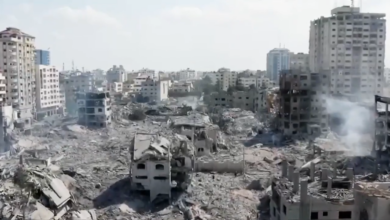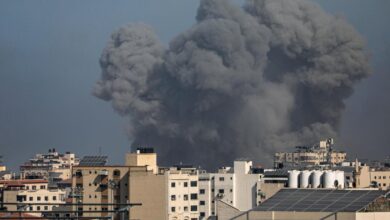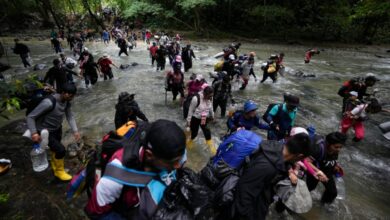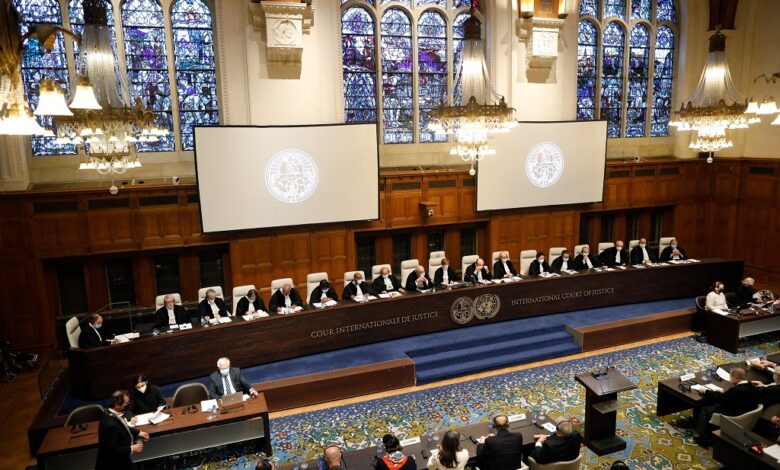
ICJ Hearing Israel Occupation – A Deep Dive
ICJ hearing Israel occupation: This complex issue, spanning decades of conflict and fraught with differing narratives, is now before the International Court of Justice. Understanding the historical context, legal arguments, and potential implications is crucial for comprehending the global ramifications of this case. The ICJ’s decision will undoubtedly shape the future of the Israeli-Palestinian conflict and the broader region.
This analysis delves into the historical context, legal arguments, international law, and potential impacts of the ICJ hearing on the Israeli-Palestinian conflict. It explores the perspectives of various stakeholders and examines the potential outcomes, including potential pathways for conflict resolution. The visual representation section will aid in understanding the complexities of the land disputes and demographic changes.
Historical Context of the Israeli-Palestinian Conflict
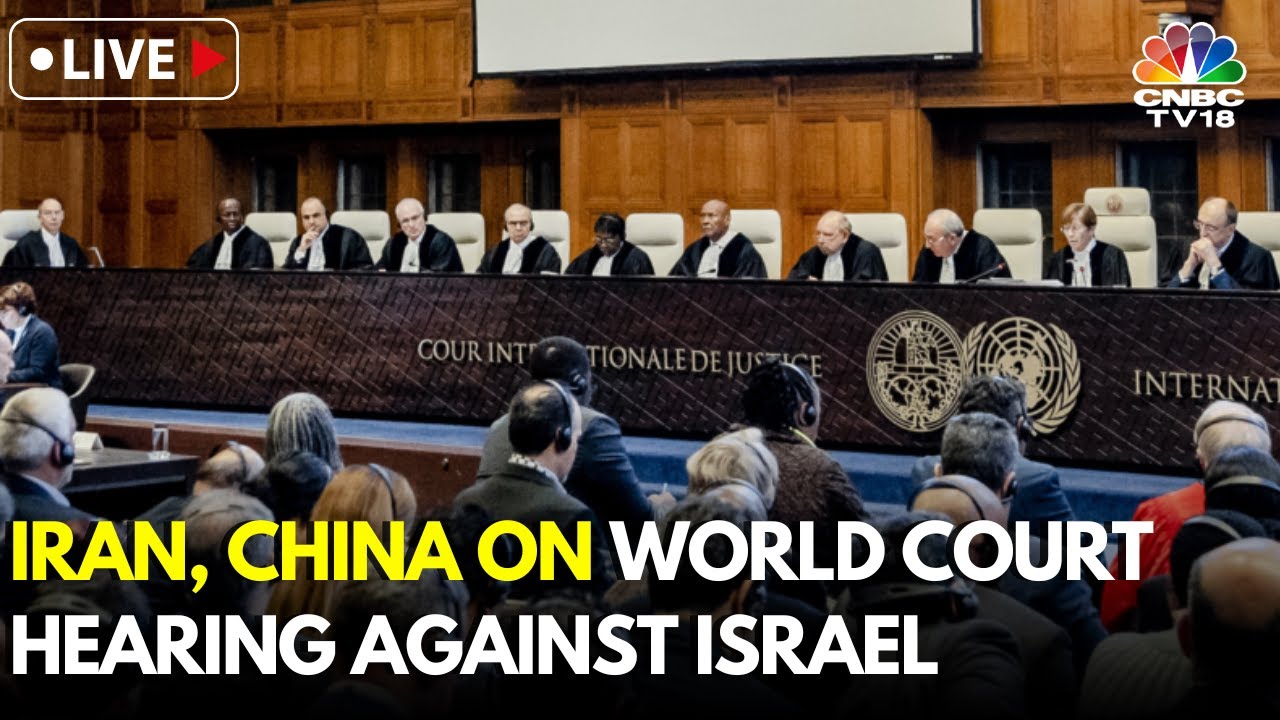
The Israeli-Palestinian conflict, a deeply rooted and complex struggle, has shaped the geopolitical landscape of the Middle East for decades. Its origins lie in competing historical claims and narratives, leading to a volatile situation that continues to affect regional stability. The International Court of Justice (ICJ) hearing provides a crucial platform to examine the historical evolution of this conflict and its legal implications.The conflict’s roots extend back to the late 19th and early 20th centuries, marked by the rise of Zionist aspirations for a Jewish homeland in Palestine, alongside the existing Palestinian Arab population’s connection to the land.
This intersection of competing aspirations, fueled by shifting political and demographic dynamics, has created a deeply entrenched conflict.
Key Events Leading to the ICJ Hearing
The establishment of the State of Israel in 1948 triggered the first Arab-Israeli War. This war, and subsequent conflicts, resulted in displacement and the creation of Palestinian refugee populations. The 1967 Six-Day War saw Israel occupy the West Bank, Gaza Strip, and East Jerusalem, a key event that significantly altered the political and territorial landscape. The following decades witnessed continued conflict, including the Oslo Accords and subsequent setbacks.
These events have all contributed to the current situation, which is now the subject of international scrutiny.
Evolution of the Israeli Occupation
The Israeli occupation of Palestinian territories began in 1967. The subsequent years saw the development of settlements, the division of Palestinian territories, and the imposition of Israeli control. Key turning points include the 1967 Six-Day War, the signing of the Oslo Accords (1993), and the continued construction of Israeli settlements in the occupied territories. Each of these events has shaped the current political and territorial landscape, and their significance is being debated in the ICJ hearing.
Different Perspectives and Narratives
The Israeli-Palestinian conflict is characterized by fundamentally different perspectives. Israelis often emphasize their historical ties to the land and the need for security. Palestinian narratives focus on the right of return, self-determination, and the displacement caused by the conflict. These divergent perspectives have profoundly shaped the narratives surrounding the conflict, making a comprehensive understanding crucial.
The ICJ hearing on the Israeli occupation is definitely a weighty issue, and it’s fascinating to consider the broader implications. The current economic climate, especially in the housing market near NYC, is also quite a hot topic right now. Are these trends somehow connected? The fluctuating costs of real estate in the region could potentially be impacted by global events like the ICJ hearing, adding a layer of complexity to the issue.
housing market near nyc is definitely worth exploring if you want to dive deeper. Ultimately, the ICJ hearing’s outcome will likely have ripple effects beyond the region.
International Responses Over Time
Various international bodies and nations have responded to the conflict in different ways. The UN resolutions, for example, have often called for a two-state solution and condemned Israeli settlements. The international community’s actions have been inconsistent, ranging from condemnation to diplomatic engagement.
| Year | Event/Resolution | International Response |
|---|---|---|
| 1948 | Establishment of Israel | Initial Arab-Israeli War, UN resolutions regarding refugees and borders. |
| 1967 | Six-Day War | Increased international concern, UN resolutions condemning occupation. |
| 1993 | Oslo Accords | A period of limited peace efforts, but not fully realized. |
| 2000s-present | Continued conflict, settlements | Ongoing international efforts at mediation, sanctions, and condemnation. |
Legal Arguments and Issues at the ICJ Hearing: Icj Hearing Israel Occupation
The International Court of Justice (ICJ) hearing regarding the Israeli occupation presents a complex interplay of legal arguments and historical contexts. Both sides, Israel and Palestine, presented their respective positions on the legality of the occupation, settlements, and related issues. The proceedings delve into the application of international law, particularly international humanitarian law and the law of self-determination, to the Israeli-Palestinian conflict.The ICJ hearing highlighted the fundamental disagreement on the interpretation and application of international law to the specific circumstances of the Israeli-Palestinian conflict.
Different legal frameworks, precedents, and interpretations are central to the case, creating a significant challenge for the Court in reaching a legally sound judgment.
Core Legal Arguments of Israel and Palestine
The core arguments presented by both sides revolve around the interpretation and application of international law, particularly international humanitarian law (IHL), and the right to self-determination. Israel’s defense often centers on its security concerns, while Palestine argues for the violation of its rights under international law.
Israeli Arguments
Israel’s legal arguments primarily focus on the security implications of the occupation and the assertion that its actions are justified in light of the ongoing conflict and the need to protect its citizens. Israel often highlights its security needs as a central factor in its actions, emphasizing the need for self-defense. They contend that the settlements are not illegal under international law and that the occupation is a temporary measure.
- Israel maintains that its security concerns justify its actions and that its actions are taken within the context of the conflict. They assert the right to self-defense as a legitimate basis for actions taken during the occupation.
- Israel emphasizes that the establishment of settlements is not inherently illegal and argues that it does not violate international law. They often cite the absence of a clear legal prohibition on settlement construction under existing international law.
Palestinian Arguments
Palestine argues that the Israeli occupation constitutes a violation of international law, particularly the Fourth Geneva Convention and the principle of self-determination. They contend that the settlements are illegal and a violation of the principle of self-determination, which grants Palestinian people the right to their own state. Palestine also argues for the recognition of the Palestinian people’s right to self-determination.
The ICJ hearing on the Israeli occupation is a crucial moment, highlighting the ongoing complexities of the situation. While these legal battles play out, it’s sobering to consider other global tragedies, like the recent disappearance of a couple on a boat near Grenada. The tragic loss of life in this case, as reported by couple missing boat grenada , underscores the vulnerability of life in various corners of the world, a stark contrast to the calculated and prolonged nature of the conflict in the ICJ hearing.
The Israeli occupation, with its profound human cost, deserves continued attention and action.
- Palestine contends that the Israeli occupation is a violation of international humanitarian law, citing the Fourth Geneva Convention and arguing that Israel has failed to protect the Palestinian population. They argue that the construction of settlements is a breach of international law, based on the lack of international legal authorization.
- Palestinian arguments emphasize the right to self-determination and the right of the Palestinian people to an independent state. They emphasize the violation of this right due to the Israeli occupation and settlement activities.
Key Legal Principles and Precedents
The ICJ hearing will likely rely on key legal principles, including the principle of self-determination, the prohibition of the use of force, and the obligations under international humanitarian law (IHL). These principles provide the framework for evaluating the legality of the occupation.
- The Fourth Geneva Convention, which governs the treatment of civilians in occupied territories, plays a crucial role in determining the legality of the Israeli actions. The convention Artikels specific protections for civilians and prohibits certain actions, such as the transfer of population and the destruction of property.
- The principle of self-determination, enshrined in the UN Charter and other international instruments, grants peoples the right to freely determine their political status and pursue their economic, social, and cultural development. This principle is central to Palestinian claims for statehood and independence.
Claims and Counterclaims
The hearing involves numerous claims and counterclaims regarding the legality of the occupation, settlements, and other related issues. Israel and Palestine present contrasting interpretations of existing international law and its applicability to the specific situation.
| Issue | Israel’s Claim | Palestine’s Claim |
|---|---|---|
| Legality of Settlements | Settlements are not illegal under international law. | Settlements are a violation of international law, particularly the Fourth Geneva Convention. |
| Occupation | Occupation is a temporary measure justified by security concerns. | Occupation is illegal and a violation of the right to self-determination. |
| International Humanitarian Law | Israel’s actions are consistent with IHL. | Israel’s actions violate IHL and the Fourth Geneva Convention. |
International Law and the ICJ’s Role
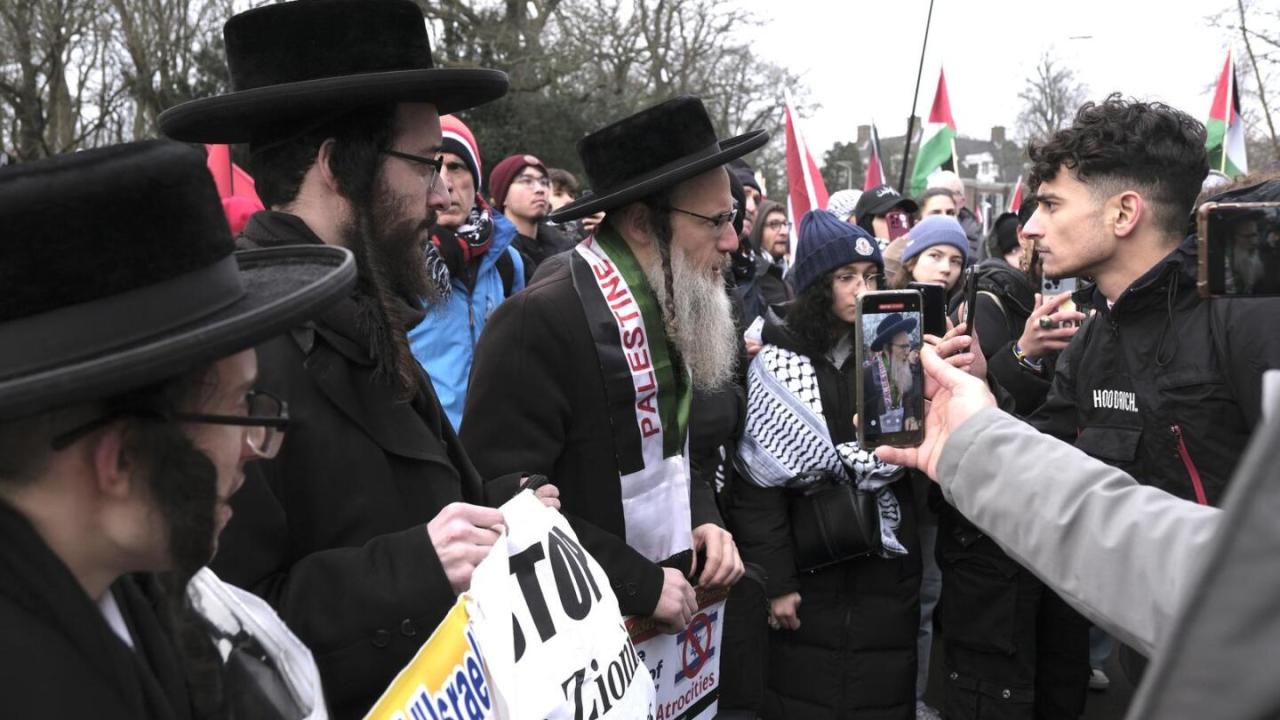
The International Court of Justice (ICJ) hearing regarding the Israeli occupation presents a crucial test of international law’s application in a complex geopolitical context. The case hinges on the interpretation and enforcement of various international agreements and conventions, particularly those related to the rights of occupied populations and the responsibilities of occupying powers. Understanding the ICJ’s role in this case requires examining the applicable international law, the Court’s mandate, and the procedures it employs.
International Humanitarian Law in the Israeli Occupation
International humanitarian law (IHL) plays a critical role in regulating armed conflict and protecting civilians. Specifically, IHL seeks to mitigate the effects of war, ensuring the humane treatment of individuals, and preserving civilian populations from harm. The application of IHL in the context of the Israeli occupation is complex, with differing interpretations and applications of the relevant conventions.
Relevance of the Fourth Geneva Convention
The Fourth Geneva Convention, which addresses the protection of civilians in times of war, is particularly relevant to the case. This convention Artikels the rights and obligations of occupying powers regarding the treatment of protected persons, including the provision of essential services, preventing displacement, and ensuring respect for human dignity. The Israeli occupation’s adherence to the provisions of the Fourth Geneva Convention is a central point of contention in the proceedings.
Other international legal instruments, such as the International Covenant on Civil and Political Rights, also bear relevance to the rights and freedoms of the Palestinian population.
ICJ’s Mandate and Jurisdiction
The ICJ’s mandate stems from the UN Charter and its Statute. The Court’s primary function is to settle legal disputes submitted to it by States and to give advisory opinions on legal questions referred to it by authorized UN organs. In the case of the Israeli occupation, the ICJ’s jurisdiction is based on the consent of the parties involved.
The ICJ hearing on Israel’s occupation is a weighty issue, bringing forth complex legal and ethical questions. However, the human cost is often overlooked. The ongoing suffering and displacement impact countless individuals, echoing the profound grief felt by people like those touched by the tragic loss detailed in articles like “grief is for people sloane crosley” grief is for people sloane crosley.
Ultimately, these interconnected struggles highlight the need for empathy and a just resolution to the ongoing occupation.
The court’s role is to interpret and apply international law, not to dictate policy or political outcomes.
ICJ Procedures in Handling Cases
The ICJ employs a structured process in handling cases, beginning with the submission of pleadings and counter-pleadings. This is followed by oral arguments, where representatives from both sides present their cases and respond to questions from the Court. Expert witnesses may also be called upon to provide evidence and analysis. Ultimately, the Court renders a judgment based on its interpretation of the applicable international law and the evidence presented.
The process aims to be fair, impartial, and transparent, upholding the principles of due process.
International Bodies Involved in the Conflict
- United Nations (UN): The UN plays a multifaceted role, including maintaining peace and security, fostering international cooperation, and providing humanitarian aid. The UN Security Council, General Assembly, and various specialized agencies have addressed the conflict at different stages.
- International Criminal Court (ICC): The ICC’s jurisdiction over alleged war crimes in the conflict is a contentious issue. The ICC’s role, as determined by the Statute of Rome, is to prosecute individuals for international crimes, including war crimes, crimes against humanity, and genocide.
- Human Rights Organizations: Numerous human rights organizations, such as Amnesty International and Human Rights Watch, have extensively documented alleged human rights violations and abuses in the Israeli-Palestinian conflict. Their reports play a critical role in providing evidence and context to the ongoing debate.
- International Committee of the Red Cross (ICRC): The ICRC, as a neutral humanitarian organization, has a long history of providing aid and assistance to victims of armed conflict. Its impartial work is vital in the provision of relief, the protection of civilians, and the promotion of humanitarian principles.
| International Body | Role in the Conflict |
|---|---|
| United Nations | Peacekeeping, humanitarian aid, and international cooperation |
| International Criminal Court | Potential prosecution of individuals for war crimes |
| Human Rights Organizations | Documentation of human rights violations and advocacy |
| International Committee of the Red Cross | Neutral humanitarian assistance and protection of civilians |
Impact and Implications of the ICJ Hearing
The International Court of Justice (ICJ) hearing on the Israeli-Palestinian conflict holds profound implications, extending far beyond the courtroom. The potential ramifications for both sides, regional stability, and international law are significant and multifaceted. This hearing will inevitably reshape the discourse on the conflict and potentially influence future actions and policies. The court’s decision, regardless of its specific findings, will undoubtedly affect the political landscape and the prospects for a peaceful resolution.The ICJ’s ruling on the Israeli occupation, if deemed unlawful, could lead to significant repercussions for Israel’s actions and policies.
This could encompass challenges to its military presence and settlements, pressure to withdraw from occupied territories, and potential legal obligations to compensate Palestinians for alleged damages. Conversely, a ruling in Israel’s favor might strengthen its position, but could also face condemnation from international bodies and potentially heighten tensions. The court’s decision will inevitably be scrutinized by both sides, each seeking to leverage the outcome for their respective narratives.
Potential Impact on the Israeli-Palestinian Conflict
The ICJ’s decision has the potential to profoundly alter the dynamic of the Israeli-Palestinian conflict. A ruling against Israel’s actions could significantly affect Israel’s military operations and settlement policies, prompting international pressure for change. This could include a demand for the dismantling of settlements, withdrawal from occupied territories, and potential sanctions. Conversely, a ruling in Israel’s favor, while potentially bolstering its legal position, could lead to further international condemnation and potentially escalate tensions.
The specific implications depend on the details of the court’s judgment and the subsequent responses of both sides.
Ramifications for Both Sides
The potential ramifications for both Israelis and Palestinians are substantial. For Israelis, a negative ruling could lead to increased pressure to adjust their policies in the occupied territories, potentially facing international sanctions and boycotts. This could lead to internal political strife and affect Israel’s relationship with international partners. For Palestinians, a positive ruling could provide legal grounds for claims of compensation and self-determination, potentially bolstering their quest for statehood.
However, the practical implementation of such a decision remains uncertain and could be highly contentious.
Impact on Regional and International Relations
The ICJ’s decision is likely to have far-reaching consequences for regional and international relations. A ruling against Israel could strain relations between Israel and other countries, particularly those with strong ties to the region. Conversely, a ruling in Israel’s favor might be perceived as a setback for Palestinian aspirations and could further destabilize the region. The court’s decision could also influence the behavior of other countries involved in similar conflicts, setting a precedent for future disputes.
Potential Pathways for Conflict Resolution or De-escalation
The ICJ’s ruling, regardless of its specific findings, could potentially pave the way for future conflict resolution efforts. It could prompt both sides to engage in negotiations, potentially leading to a renewed commitment to peace talks. A binding decision could offer a framework for negotiations and a clearer understanding of legal obligations for both parties. However, the potential for de-escalation hinges on the willingness of both sides to engage constructively.
Possible Outcomes and Implications
| Outcome | Implications for Israel | Implications for Palestinians | Regional Impact |
|---|---|---|---|
| ICJ rules against Israel | Increased international pressure, potential sanctions, strained relations with allies, internal political turmoil. | Potential legal basis for compensation claims, enhanced international support for self-determination. | Increased regional tension, potential for escalation, re-evaluation of international relations in the region. |
| ICJ rules in favor of Israel | Reinforced legal position, but potential for further international condemnation and heightened tensions. | Weakened legal position, possible further marginalization and frustration. | Potential for a stalemate, further entrenchment of positions, continued regional instability. |
| ICJ rules partially in favor of either side | Mixed implications, depending on the specific rulings, potential for limited changes in policy. | Mixed implications, depending on the specific rulings, potential for limited gains. | Potential for further negotiations, but a long road ahead for resolution. |
Public Opinion and Global Perspectives
The International Court of Justice (ICJ) hearing on the Israeli-Palestinian conflict has ignited a global debate, exposing deep-seated divisions and diverse perspectives on the issue. Public opinion, shaped by historical narratives, political alliances, and media coverage, plays a crucial role in how the conflict is perceived and discussed. Understanding these varying viewpoints is essential to grasping the complex interplay of factors influencing the outcome of the proceedings and the long-term trajectory of the situation.
Varying International Reactions
Different countries and international organizations have responded to the ICJ hearing in diverse ways. Some express strong support for the Palestinian position, emphasizing their right to self-determination and condemning the Israeli occupation. Conversely, others express concern for Israel’s security interests and maintain a more neutral stance. The nuanced responses highlight the multifaceted nature of the conflict and the difficulty in achieving a universally accepted solution.
The ICJ hearing on Israel’s occupation is a crucial moment, highlighting the need for international intervention. Protecting human rights is paramount, and this includes preventative measures like proper use of condoms, as crucial as they are in preventing the spread of HIV/AIDS. Understanding the importance of condon prevencion vih sida is vital in the larger context of the ongoing conflict and the human cost of the occupation.
The ICJ’s role in ensuring a just and equitable resolution remains vital.
Role of Public Opinion
Public opinion significantly shapes the discourse surrounding the Israeli-Palestinian conflict. Media coverage, political narratives, and personal experiences contribute to the formation of public attitudes. For instance, differing interpretations of historical events and ongoing conflicts often influence public perceptions.
Public Opinion in Different Regions
Public opinion varies considerably across different regions. Surveys and polls offer insights into the prevailing sentiments in specific areas. However, it’s crucial to recognize the limitations of these surveys, including potential biases and sampling methodologies.
Positions of Major Global Powers
Major global powers hold varying positions on the issue. Their stances are often influenced by geopolitical considerations and their relationships with both Israel and Palestine. Understanding these positions is critical to evaluating the potential impact of the ICJ hearing on the conflict’s trajectory.
Comparative Table of Public Opinion
| Region | General Sentiment | Key Considerations | Examples |
|---|---|---|---|
| Western Europe | Generally supportive of Palestinian claims | Emphasis on human rights and international law | Protests and demonstrations in favor of Palestinian rights are common in European capitals. |
| United States | More divided, with strong support for Israel | Security concerns and strategic alliances with Israel | Lobbying efforts by pro-Israel groups influence public discourse. |
| Middle East | Significant support for Palestinian cause, often influenced by regional politics | History of conflict and competing narratives | Protests and demonstrations in support of Palestinian rights are often seen in Arab countries. |
| Asia | Diverse range of views, often influenced by economic and strategic interests | Varying levels of engagement with the conflict | China’s neutral stance and India’s interest in regional stability are examples. |
Future Developments and Potential Outcomes
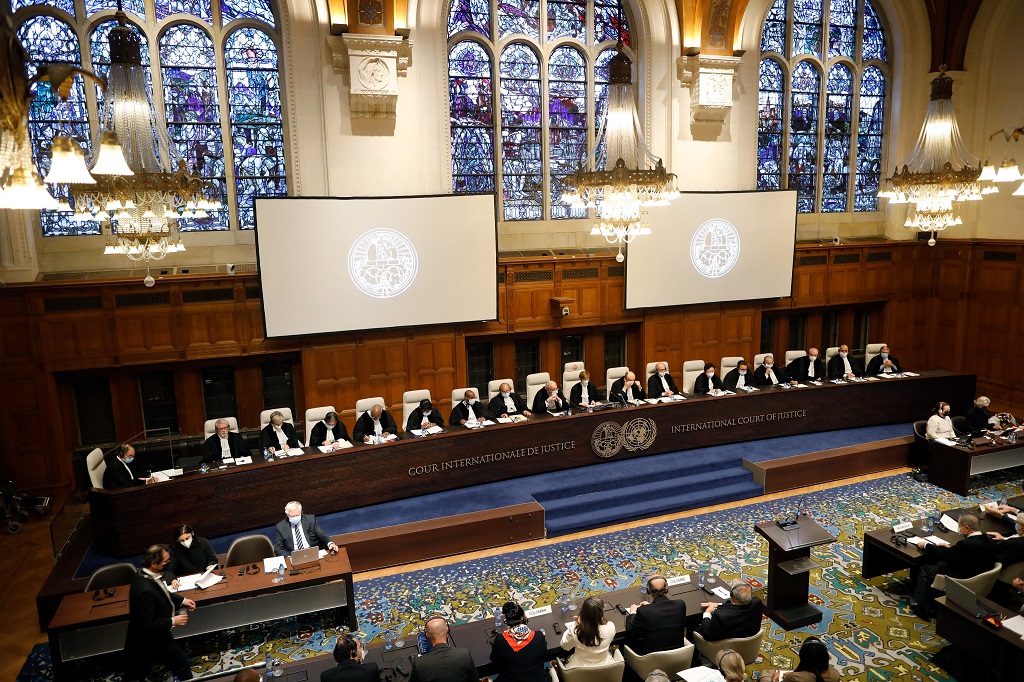
The International Court of Justice (ICJ) hearing on the Israeli-Palestinian conflict presents a complex juncture. While the ICJ’s role is primarily legal, its pronouncements can significantly impact the political landscape and potentially foster new avenues for conflict resolution. The hearing’s outcome, regardless of its specific rulings, will undoubtedly shape future interactions and perceptions between Israelis and Palestinians, as well as the international community’s engagement with the issue.The potential outcomes of the ICJ hearing range from incremental changes to more profound shifts in the conflict’s trajectory.
The legal arguments, political realities, and the diverse global perspectives all play a crucial role in determining the eventual impact. The long-term implications of the ICJ’s decisions, including the potential for diplomatic initiatives and peace processes, will be crucial in determining the conflict’s future.
Potential Future Developments
The ICJ hearing’s impact on future developments will be multifaceted, influenced by the legal arguments, the political context, and the subsequent international response. The court’s findings, if they hold legal weight, can potentially spur a variety of diplomatic initiatives and shift the dynamics between Israel and Palestine. This might involve a renewed focus on peace talks, increased international pressure on both sides, or a more pronounced shift in global public opinion towards one or both parties.
Potential Scenarios and Outcomes
The legal arguments presented and the political context will influence the outcome. Different scenarios are possible, ranging from incremental changes to more substantial shifts in the conflict’s trajectory. The outcomes will depend on the specific rulings, the willingness of both sides to engage in dialogue, and the broader international community’s response. Ultimately, the long-term implications will depend on the actions taken by all parties involved.
- Outcome 1: Limited Impact, Continued Stalemate. The ICJ ruling might be seen as insufficient to significantly alter the status quo. This could lead to a continuation of the existing political stalemate, with little immediate change in the ground situation. Israel and Palestine might remain entrenched in their positions, hindering any meaningful progress toward a resolution.
- Outcome 2: Increased International Pressure. The ICJ’s findings could generate significant international pressure on both Israel and Palestine to implement certain measures or engage in negotiations. This scenario could lead to a renewed push for peace talks, mediated by international actors, but the willingness of both sides to participate would remain uncertain.
- Outcome 3: Shift in Global Public Opinion. The ICJ hearing could shift global public opinion towards one side or the other. This could impact future diplomatic efforts and international support for either side, potentially influencing the balance of power in the conflict.
Possible Diplomatic Initiatives and Peace Processes, Icj hearing israel occupation
The ICJ hearing could serve as a catalyst for renewed diplomatic initiatives and peace processes. The court’s findings might provide a framework for negotiations, or a starting point for discussions on long-term solutions. These initiatives might involve international mediators, third-party actors, or a combination of these approaches. Success would hinge on the willingness of both sides to engage in good faith negotiations and compromise.
- International Mediation Efforts. The ICJ ruling might incentivize international actors to step in with renewed mediation efforts. This could involve facilitating dialogue between Israel and Palestine, exploring potential compromise solutions, and pushing for a more equitable resolution to the conflict.
- Re-evaluation of Existing Agreements. The court’s findings could prompt a re-evaluation of existing agreements and treaties related to the Israeli-Palestinian conflict. This could potentially lead to revisions or renegotiations of these agreements to address the concerns raised in the hearing.
Potential for Long-Term Solutions
The ICJ hearing, while not a guaranteed path to a lasting resolution, could offer a platform for discussing long-term solutions. The court’s potential pronouncements on legal and humanitarian issues could pave the way for sustainable peace and create a framework for a lasting resolution.
| Potential Outcome | Possibility | Description |
|---|---|---|
| Limited Impact, Continued Stalemate | High | No significant shift in the status quo, continued conflict. |
| Increased International Pressure | Medium | Renewed efforts towards peace talks, but uncertain participation. |
| Shift in Global Public Opinion | Medium | Potential shift in international support and diplomatic engagement. |
| Renewed Diplomatic Initiatives | Low | Limited chance of success unless both sides are willing to negotiate. |
| Long-Term Solutions | Low | Potential framework for discussion, but requires substantial political will. |
Visual Representation of the Conflict
The Israeli-Palestinian conflict is a complex tapestry woven from decades of historical grievances, territorial disputes, and shifting demographics. Visual representations can offer a powerful way to understand the multifaceted nature of this conflict, highlighting the historical context, the land disputes, and the human impact. Illustrations, timelines, and demographic data can bring the narrative to life, fostering a deeper understanding of the conflict’s evolution and the challenges it presents.Visual aids can be particularly effective in bridging the gap between abstract concepts and tangible realities.
By presenting the conflict through images, maps, and charts, we can move beyond the often polarized rhetoric and engage with the human cost of this ongoing struggle. This section will explore the power of visualization in understanding the Israeli-Palestinian conflict.
Land Disputes and Territorial Evolution
The Israeli-Palestinian conflict is fundamentally a dispute over land. A crucial step in understanding the conflict is visualizing the evolution of the region. A map illustrating the territories claimed by both sides throughout history, with key dates and events marked, would be a powerful tool. For instance, the map could trace the historical boundaries of Palestine under different empires and the subsequent establishment of the state of Israel.
Such a map would reveal how the borders of the territories have been contested and redefined over time. Moreover, it’s important to illustrate the different interpretations of historical claims to the land, which are often at the root of the conflict.
Demographic Changes
The demographic landscape of the region has undergone significant transformations over time. A series of bar graphs or population pyramids could effectively demonstrate the shifting populations of both Israelis and Palestinians in the contested territories. This would include data on population growth, migration patterns, and the impact of specific events on demographic distribution. For example, data on the influx of Jewish settlers into the West Bank, or the displacement of Palestinian populations, could be visualized using clear and easily understood charts.
Such data would offer a compelling perspective on the evolving demographics of the region and their role in shaping the conflict.
Impact of Settlements on the Palestinian Population
The construction of Israeli settlements in the occupied Palestinian territories has had a significant impact on the Palestinian population. This impact can be visualized through a series of maps, each highlighting the expansion of settlements over time. Overlaying this settlement data on a map showing Palestinian communities, agricultural lands, and infrastructure, would graphically illustrate the impact of settlements on access to resources, mobility, and overall quality of life for Palestinians.
The ICJ hearing on Israel’s occupation is a crucial moment, highlighting the ongoing struggles. Meanwhile, the tragic NYC shooting on the D train, as reported in this CNN article , underscores the urgent need for addressing violence and instability in our world. Ultimately, the ICJ hearing, despite these distractions, remains a vital step in seeking a just resolution for the region.
Additionally, illustrative data showing the displacement of Palestinian populations due to settlement expansion, the confiscation of land, and the disruption of economic activities would be helpful.
Timeline of the Conflict
A visual timeline of the conflict, presented as a graphic, can effectively communicate the sequence of key events and their connections. This graphic should include key dates, events, and significant agreements, showing how each event shaped the conflict’s trajectory. Visual cues, such as different colored boxes for major events, agreements, or declarations, could be used to highlight periods of escalation, de-escalation, or significant turning points.
This would allow the viewer to quickly grasp the historical progression of the conflict.
Closure
In conclusion, the ICJ hearing on Israel’s occupation of Palestinian territories presents a critical moment in international relations. The potential consequences of the court’s decision extend far beyond the immediate parties, potentially influencing regional and global stability. The differing perspectives and legal arguments presented highlight the deep-seated nature of the conflict and the difficulty in achieving lasting peace.
The future of this critical issue remains uncertain, and the outcome will undoubtedly have significant implications for the future.
FAQ Overview
What are the key legal arguments presented at the ICJ hearing?
Both Israel and Palestine presented detailed arguments regarding the legality of the occupation, settlements, and other related issues. Israel’s arguments often centered on its security concerns and historical claims, while Palestine’s arguments emphasized violations of international humanitarian law and human rights.
What is the role of the Fourth Geneva Convention in this case?
The Fourth Geneva Convention is a cornerstone of international humanitarian law, regulating the treatment of civilians during armed conflict. Both sides have invoked its provisions in their arguments, with significant disagreement on its application in the Israeli-Palestinian context.
What are the potential long-term solutions to the conflict?
Possible long-term solutions range from a two-state solution to a confederation or other models. The complexities of the issue, including differing political agendas, deep-seated mistrust, and the ongoing impact of historical events, necessitate a multifaceted approach for potential solutions.
How does public opinion influence the discourse surrounding the conflict?
Public opinion plays a crucial role in shaping the political landscape and influencing international pressure. Different regions hold diverse views on the conflict, and this impacts diplomatic efforts and potential resolutions.



